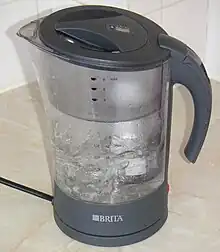Brita (company)
Brita GmbH is a German manufacturer of water filters headquartered in Taunusstein near Wiesbaden, Hesse. The company's manufacturing facilities are located in China, Germany, Switzerland, Italy, and the United Kingdom.[1] Brita products are distributed in 69 countries.[2]
 Logo primarily used in North America, and South America | |
| Type | Privately held family business |
|---|---|
| Industry | Water filtration |
| Founded | 1966 |
| Founder | Heinz Hankammer |
| Headquarters | Taunusstein, Germany, Taunusstein, Germany (Brita SE)
Oakland, CA (Brita LP) |
Area served | Worldwide |
Key people | Markus Hankammer (CEO) |
| Products | Water filters |
| Brands | Brita (outside of the Americas), Mavea |
| Revenue | €664 million (2022) |
Number of employees | 2,242 worldwide (2022) |
| Website | www |
| Footnotes / references [1] | |

Products

A number of products are made by Brita. These include:
- Brita Faucet Mount Filters: These filters can be attached directly to the kitchen faucet, delivering instant filtered water for drinking and cooking.
- Brita Filtering Water Bottles: Brita offers water bottles with built-in filters, allowing users to enjoy filtered water on the go.
- Brita Dispensers and Water Coolers: Brita provides larger capacity water dispensers and coolers for offices, events, or homes with high water consumption.
- Brita Replacement Filters: Brita offers a range of replacement filters for their pitchers, faucet mount filters, and water bottles to maintain optimal filtration performance.
How Brita works
Brita uses a filtration system to improve the quality of tap water. The exact filtration process can vary depending on the specific product, but here is a general overview of how Brita works:
- Activated Carbon Filtration: Brita filters use activated carbon, which has tiny pores that trap impurities like chlorine, sediment and microplastic as water passes through.
- Ion Exchange Resin: Some Brita filters also have ion exchange resin, which reduces heavy metals by exchanging them with harmless ions like calcium.
- Mechanical Filtration: Brita filters often include a physical barrier to capture larger particles and sediment, improving water clarity and taste.
History
Brita was founded in 1966 by Heinz Hankammer. The company was first named AquaDeMat before he later named the company after his daughter.[3] The company secured the first patent for domestic water filter use in the 1970s.[4]
In 1988,[5] The Clorox Company, based in Oakland, California, entered in a licensing-and-distribution agreement with the German company for North and South America. In 1995, it added the Canadian rights by acquiring Canada's Brita International Holdings. In 2000, Clorox acquired the sole rights to the brand in the Americas[6] and Brita agreed to a non-compete clause until 2005. In 2008, Brita returned to the North American market under the brand Mavea,[7] only to withdraw again in 2016.[8] However, products are still sold in the US under the Brita brand.
References
- Facts & figures. Brita UK. Retrieved 2023-09-30.
- "About BRITA Group". Brita UK. Retrieved 2020-10-27.
- "The Start of Success". Brita. Brita. Retrieved 7 October 2020.
- "Brita Opens the Door". Brita. Brita. Retrieved 7 October 2020.
- HBS case 9-500-024, January 15, 2002, Page 1
- "Clorox Secures Brita Business In Americas", HomeWorld Business. November 27, 2000.
- Carr, Coeli (2010-05-20). "Pouring It On". Time. Archived from the original on May 23, 2010.
- "The Best Water Filter Pitcher". Wirecutter. Retrieved 2018-04-03.
External links
- Official website

- Brita UK website
- Mavea, website for Brita's U.S. brand that is not licensed to Clorox.